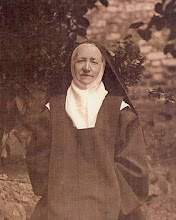Primacy of the contemplative spirit.
A direct and intimate experience with God is the basis of Carmel spirituality. Therefore, before any Rule, and in order that the Rule may be lived when it is formulated, a contemplative spirit and a deep sense of God are required of those who wish to lead the life of Carmel.
Of one who understands how to stay before God, no special activity, no special practical disposition is required. While, on the contrary, this sense of God, this thirst to remain in His presence does not belong to that category of realities that a Rule or a technique can call into being. Nor can they be developed in any way ascertainable by the sense. They must exist prior to the realization of a contemplative religious life. God Himself has placed them in the soul's very centre and ceaselessly maintains them by means of His grace and His Holy Spirit.
This enables us to understand how, although it is not an institution in the western meaning of the term but only a place for the election of a spiritual reality, Carmel has long been able to exist in a free, spontaneous, elementary way and to subsist through the sheer power of its "spirit".
This primacy of "spirit", necessary in every religious institute seems even more necessary in Carmel.
No exterior activity, whatever be its form, not even fidelity to the Rule, jealously guarded though this must be, can ever take the place of what ought to be the soul of Carmel, we mean the divine current that reaches the depths of man's being and impels the Carmelite to return constantly to his centre.
This search for God, so essential and so secret, leads of itself to simplicity and spiritual poverty. Instinctively the soul seeking God longs to be disencumbered, to be delivered from all things spiritual and material, in order to think of God alone, to be freed from things of the flesh in order to attain to life in the spirit, and to become altogether spiritual.
An idea like this necessarily leads to a spiritual conception of religious life. In fact, nowhere as much as in Carmel must life and observances be vivified by the spirit.
That is why a religious as familiar with the origins of Carmel as John of Saint-Samson could write in "De la perfection et decadence de la vie religieuse":
"I say that in the days of these first patriarchs and founders, religious life (at Carmel) was a body strongly and excellently animated by spirit, or rather it was all spirit, and all fervent spirit."
In fact the ideal of Carmel was always, according to the expression of this same author in "Le vrai esprit du Carmel," "to live in a state of great purity... and to enter into God with all one's strength".
It is obvious that John of Saint-Samson here refers to the "Institution des premiers moines," a text highly representative of the spirit of Carmel and of its oldest and purest mystical traditions. In it we read these lines in which the author seeks to describe the life of the first hermits of Carmel.
"This life has a double end. The first is ours as the result of our virtuous work and effort, divine grace aiding us. It consists in offering God a holy heart, freed from all stain of actual sin. We attain this end when we are perfect and in Carith (which means ' hidden in charity ')...The second end of this life is communicated to us as God's pure gift. I mean that not only after death but here in this mortal life we can in some way in our hearts taste and experience in spirit the power of the divine presence and the sweetness of heavenly glory. This is called drinking from
the torrent of divine pleasure."
At Carmel, purity of heart is never disassociated from delight in things divine. The illusion most to be dreaded has always been to aspire to the highest gifts while disdaining or underestimating the necessary publications. There is another and equally dangerous snare: to try to live a life of high perfection for its own sake and not to aspire to receive the communication of divine life. Carmelite spirituality consists of a supernatural balance which is only possible where there is habitual recourse to the spirit with humility of heart. Although Carmel can see the weakness of its children without astonishment or pessimism, and because it
counts on the abundance of divine mercy to remain undisturbed, it has no pity for the slightest shadow that soils the soul. A man who voluntarily harbors some vain attachment in his heart is not a spiritual man. But of what price is purity without spiritual fruitfulness? A detachment in which there is no love?
In fact theological primacy makes it impossible for the Carmelite soul to deviate in his pursuit of his double goal. If he aspires to love with the love of God Himself, it is because he is strong in his hope, resolute in his faith, docile in all things to the invitations of the Spirit; it is because he depends on God alone.
skip to main |
skip to sidebar
This site wishes to promote the spirit and traditions of the Discalced Carmelite Order. It is dedicated to Mother Mary of Jesus OCD (Madeleine Dupont) who did so much to establish Carmel in Britain.
